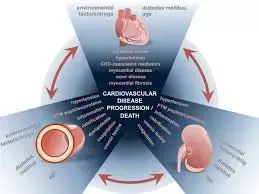- Home
- Medical news & Guidelines
- Anesthesiology
- Cardiology and CTVS
- Critical Care
- Dentistry
- Dermatology
- Diabetes and Endocrinology
- ENT
- Gastroenterology
- Medicine
- Nephrology
- Neurology
- Obstretics-Gynaecology
- Oncology
- Ophthalmology
- Orthopaedics
- Pediatrics-Neonatology
- Psychiatry
- Pulmonology
- Radiology
- Surgery
- Urology
- Laboratory Medicine
- Diet
- Nursing
- Paramedical
- Physiotherapy
- Health news
- Fact Check
- Bone Health Fact Check
- Brain Health Fact Check
- Cancer Related Fact Check
- Child Care Fact Check
- Dental and oral health fact check
- Diabetes and metabolic health fact check
- Diet and Nutrition Fact Check
- Eye and ENT Care Fact Check
- Fitness fact check
- Gut health fact check
- Heart health fact check
- Kidney health fact check
- Medical education fact check
- Men's health fact check
- Respiratory fact check
- Skin and hair care fact check
- Vaccine and Immunization fact check
- Women's health fact check
- AYUSH
- State News
- Andaman and Nicobar Islands
- Andhra Pradesh
- Arunachal Pradesh
- Assam
- Bihar
- Chandigarh
- Chattisgarh
- Dadra and Nagar Haveli
- Daman and Diu
- Delhi
- Goa
- Gujarat
- Haryana
- Himachal Pradesh
- Jammu & Kashmir
- Jharkhand
- Karnataka
- Kerala
- Ladakh
- Lakshadweep
- Madhya Pradesh
- Maharashtra
- Manipur
- Meghalaya
- Mizoram
- Nagaland
- Odisha
- Puducherry
- Punjab
- Rajasthan
- Sikkim
- Tamil Nadu
- Telangana
- Tripura
- Uttar Pradesh
- Uttrakhand
- West Bengal
- Medical Education
- Industry
Spironolactone fails to improve CV outcomes in patients with stage 3b chronic kidney disease: Study

Spironolactone fails to improve CV outcomes in patients with stage 3b chronic kidney disease suggests a study published in Nature Medicine.
Chronic kidney disease (CKD) is associated with a substantial risk of progression to end-stage renal disease and vascular events. The nonsteroidal mineralocorticoid receptor antagonist (MRA), finerenone, offers cardiorenal protection for people with CKD and diabetes, but there is uncertainty if the steroidal MRA, spironolactone, provides the same protection.
In this prospective, randomized, open, blinded endpoint trial, we assessed the effectiveness of 25 mg spironolactone in addition to usual care or usual care alone for reducing cardiovascular outcomes in stage 3b CKD among an older community cohort (mean age = 74.8 years and s.d. = 8.1). We recruited 1,434 adults from English primary care, of whom 1,372 (96%) were included in the primary analysis. The primary outcome was time from randomization until the first occurrence of death, hospitalization for heart disease, stroke, heart failure, transient ischemic attack or peripheral arterial disease, or first onset of any condition listed not present at baseline.
Across 3 years of follow-up, the primary endpoint occurred in 113 of 677 participants randomized to spironolactone (16.7%) and 111 of 695 participants randomized to usual care (16.0%) with no significant difference between groups (hazard ratio = 1.05, 95% confidence interval: 0.81–1.37). Two-thirds of participants randomized to spironolactone stopped treatment within 6 months, predominantly because they met prespecified safety stop criteria. The most common reason for stopping spironolactone was a decrease in the estimated glomerular filtration rate that met prespecified stop criteria (n = 239, 35.4%), followed by participants being withdrawn due to treatment side effects (n = 128, 18.9%) and hyperkalemia (n = 54, 8.0%). In conclusion, we found that spironolactone was frequently discontinued due to safety concerns, with no evidence that it reduced cardiovascular outcomes in people with stage 3b CKD. Spironolactone should not be used for people with stage 3b CKD without another explicit treatment indication.
Reference:
Hobbs, F.D.R., McManus, R.J., Taylor, C.J. et al. Low-dose spironolactone and cardiovascular outcomes in moderate stage chronic kidney disease: a randomized controlled trial. Nat Med (2024). https://doi.org/10.1038/s41591-024-03263-5
Dr. Shravani Dali has completed her BDS from Pravara institute of medical sciences, loni. Following which she extensively worked in the healthcare sector for 2+ years. She has been actively involved in writing blogs in field of health and wellness. Currently she is pursuing her Masters of public health-health administration from Tata institute of social sciences. She can be contacted at editorial@medicaldialogues.in.
Dr Kamal Kant Kohli-MBBS, DTCD- a chest specialist with more than 30 years of practice and a flair for writing clinical articles, Dr Kamal Kant Kohli joined Medical Dialogues as a Chief Editor of Medical News. Besides writing articles, as an editor, he proofreads and verifies all the medical content published on Medical Dialogues including those coming from journals, studies,medical conferences,guidelines etc. Email: drkohli@medicaldialogues.in. Contact no. 011-43720751


